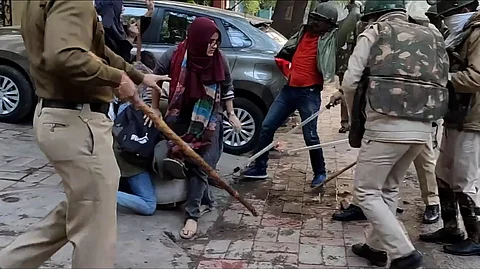

Fifteenth of December 2019 is remembered, and mostly loathed, for the way police forces were unleashed in the Jamia Millia Islamia University’s campus in New Delhi to clamp down on students who dissented the Citizenship (Amendment) Bill. On the same night, more than 130 kilometers away in Uttar Pradesh, police barged into another University and brought their weapons – tear gas shells, stun grenades, stones, and lathis, their standard tool kit to disperse protestors – down on students who had come out on the campus ground to extend their solidarity to those injured in Jamia. But the second story, which unravelled at the Aligarh Muslim University, did not get the attention of the first. Sparing a few news reports, little about the AMU attacks is out there, says Ehraz Zaman, who felt compelled to make a documentary about it.
“I think the most shocking part was the scale of the whole incident. Since the discourse around 15th December was dominated by Jamia, the whole incident inside AMU got buried. When I began researching with Farwah (co-producer), we found that there was barely any news reportage on the incident. What added to our initial shock was the slow realisation that the violence in AMU was much more brutal than that of Jamia,” Ehraz says.
Watch: Trailer of the documentary
His documentary titled In A Dissent Manner began as a pact to make a film by the end of 2022, having been “consumed by movies” as a Bachelor of Commerce student in AMU, and simply wanting to make one himself. He calls the filmmaking videos and essays he obsessively watched on YouTube his first film school. It was afterward that he joined for Masters in Mass Communication at the JMI, thus becoming part of both Universities which faced the wrath of the state for voicing protest against the contentious Citizenship Amendment Act.
Two weeks ago, the Act once again surfaced with the Home Minister of the country Amit Shah promising to implement it before the upcoming Lok Sabha elections in May. COVID-19 breaking out in early 2020 had put the CAA on a backburner, and the protests, including the famous Shaheen Bagh sit-in in Delhi, observed by hundreds of women, had to be put on hold.
Ehraz’s documentary which came out years after the incident is a reminder of the brutalities, long forgotten amid a gruelling pandemic. “Apart from documenting such a shocking incident, I wanted my film to act as a mirror for Muslims to see just how much the state and the authorities detest us. Just the fact that they would go to this extent to control mere students says so much,” he says.
In the visuals he packed between the statements of students and teachers of AMU, is the footage of the December 15 attack. A hostel room was burned, and a student lost his thumb, while another one almost lost his palm, Ehraz says. “Many were detained, tear gas and stun grenades were used, and to do what; disperse students who were doing nothing but protesting within the premises of their own University. And the fact that someone like me, who was living in the same city at the time, would have no clue of the scale of this violence meant that the State had been successful in suppressing the whole incident. That's another reason why it was important to tell this story,” says the documentary maker.
His documentary was selected for national and international film festivals, premiering at the International Documentary and Short Film Festival of Kerala in 2022. It won the Cinema of Resistance award at the 2023 SIGNS Film Festival. He hopes that the film will become a stark reminder of the state of Muslims in the country.
“The only thing that can fight this authoritative and Islamophobic regime is our collective consciousness and I would want my film to play a small part in that. Everyone needs to know what's being done to the Muslims of this country so that we can, despite our many differences, come together and fight this disease as one single force. Apart from this, I also want people to draw a little bit of hope from the students and understand that it's our responsibility to protest in whatever capacity. One should be the voice of dissent they seek around them,” Ehraz says.